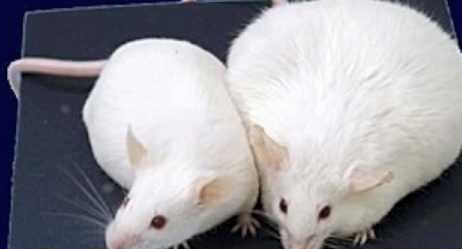By Dane Lorica, | November 27, 2016

Lab mice were used to study what causes recurring weight gain even after dieting. (YouTube)
The Weizmann Institute has revealed that relapsing obesity even after strict dieting occurs due to the presence of certain gut bacteria. Researchers revealed that exercise, appetite, and metabolism are not just the factors that result in weight rebound.
Using laboratory mice, scientists were able to study the gut microbes. In fact, the researchers said that it is possible to predict if an individual would gain weight after dieting using an algorithm related to germ count. They added that the algorithm might be beneficial for assessing dieters who return to their original or heavier weight even after a year of diet monitoring and control.
Like Us on Facebook
The study is a collaborative work of immunologists and computer scientists from the Weizmann Institute of Science. The mice used in the experiment were fed with different food including the high fat and normal variants. Following the diet, the original weight of the laboratory animals returned except for the bacteria in their gut. The authors revealed that changes in the microbiome of the murine species would result in the reduction of energy use.
In 2014, Obesity was reported as a serious health issue by the Institute of Health Metrics and Evaluation at the University of Washington. The institute revealed that nearly a third of the global population is classified as overweight or obese and that 2.8 million adult deaths are recorded annually due to health problems linked to obesity.
In 2015, a report was published stating that an obese person with 30-35 body mass index and underwent a year of dieting only has a 1 in 210 men and 1 in 124 women probability of achieving normal weight. Meanwhile, those with BMI of 40-45 have lower chances of achieving normal weight: 1 in 677 for women and 1 in 1,290 for men.
Eran Elinav said that "nobody looked at the possible role of intestinal bacteria in relapsing obesity, though the dynamic of swinging weight characterizes about 80 percent of overweight people in the world." The study published in Nature is expected to apply to humans as well. The researcher added that "when we began to read the literature, we understood that science is just scratching the surface, and that we know nothing about weight gain."
The researchers explained that it is easy to blame a patient for the relapse of their weight. However, Elinav clarified that the relapse cannot be fully explained by psychology and that "when you look at the vast body of literature on dieting, it's pretty surprising to see that almost all diets work in the short run, and people do lose weight, but in the longer run, 12 months or more, 95 percent of them regain their original weight or more." The scientists said that individuals have varying population of microbiome in their guts, same with mice.
The study did not show how the gut bacteria caused relapsing obesity. However, the data showed that there was altered metabolism suggestive of the conversion of energy into fats initiated by microbes.
-
Use of Coronavirus Pandemic Drones Raises Privacy Concerns: Drones Spread Fear, Local Officials Say

-
Coronavirus Hampers The Delivery Of Lockheed Martin F-35 Stealth Fighters For 2020

-
Instagram Speeds Up Plans to Add Account Memorialization Feature Due to COVID-19 Deaths

-
NASA: Perseverance Plans to Bring 'Mars Rock' to Earth in 2031

-
600 Dead And 3,000 In The Hospital as Iranians Believed Drinking High-Concentrations of Alcohol Can Cure The Coronavirus

-
600 Dead And 3,000 In The Hospital as Iranians Believed Drinking High-Concentrations of Alcohol Can Cure The Coronavirus

-
COVID-19: Doctors, Nurses Use Virtual Reality to Learn New Skills in Treating Coronavirus Patients







